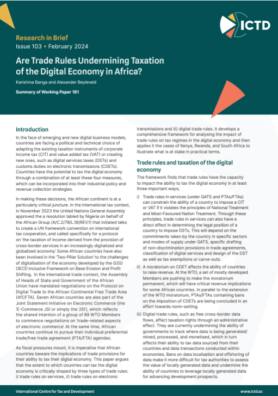Research in Brief 103
In the face of emerging and new digital business models, countries are facing a political and technical choice of adapting the existing taxation instruments of corporate income tax (CIT) and value added tax (VAT) or creating new ones, such as digital services taxes (DSTs) and customs duties on electronic transmissions (CDETs). Countries have the potential to tax the digital economy through a combination of at least these four measures, which can be incorporated into their industrial policy and revenue collection strategies.
